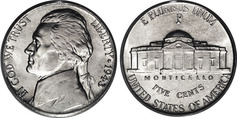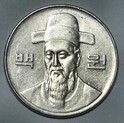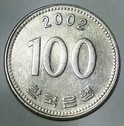 A nickel (from here)
A nickel (from here)
It’s mostly pennies, nickels, and dimes. Once or twice, I offered a gold-dollar coin as a big, end-of-semester prize to a winner of one contest or other.
Often, the kids are dazzled by these coins.
 Front of a 100-Won coin
Front of a 100-Won coin
A little “social experiment” came together in my mind when I realized I had coins from both countries. I offered well-performing students a choice between a nickel and a 100-won piece.
 Back of a 100-Won coin
Back of a 100-Won coin
I don’t think this should be a surprise. The motivation is the same:
— Type #1’s thinking:“I can buy things with 100-Won coin, but that nickel is of no use to me.”
— Type #2’s thinking: “Although I could use the 100-Won coin, the nickel is something new and fascinating; I’ve never possessed one, or even held one in my hand before. The nickel is much more appealing!”
It’s clear which kind of student-temperament would tend to do better in language learning.
It’s also tempting to extrapolate this simple coin-choice “experiment” into an entire Weltanschauung, as above. Although that leap may be both reckless and hasty, it really makes sense to me. It also, I think, could point to why Koreans are (collectively) so famously-bad at learning English, despite their huge commitment to it for so long: The Type #1 attitude (above) prevails in this society. Most Koreans, I think, see English as not relevant to their lives beyond some piece-of-paper that says they got such-and-such a score, qualifying them for this-or-that.
This “#1” attitude even dominates most hagwons (language-learning institutes, at which I work), it seems to me. I was just thinking about the fact that my present-place-of-employment has a whole lot of signs hanging on the walls. They are all in Korean only. If this hagwon were committed to English, it would put them in both languages.
